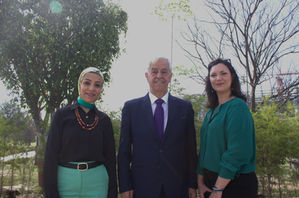
FROM THE DIRECTOR'S DESK

RATIONALISING THE IRRATIONAL IN THE
MIDDLE EAST
Trajectories of diplomacy and sustainable development, governance, state-building, foreign policy, and international relations to address the issues of war and peace in the Middle East, have always been stumbled upon by external actors, be it the super powers, free riders or the local, driving the Middle East into a state of unrest, leaving behind a long series of dire social, political, economic and humanitarian impacts on the people, and imminent threats to world peace and security.
Historiography and current evidence reflect the highly volatile and chronic conflicts and struggle for and in the Middle East; making it the focus of world powers’ self-centric attention and interests, driven by egoistic motives that are tarnished by three curses: a) natural resources of oil and gas, b) geography of geostrategic location, and c) haphazard imposition of diverse culture, generating interstate and intrastate conflicts and wars.
A purview of the conflict’s phases; beginning with its grass roots; a) Palestinian cause-the core issue, b) the Arab-Israeli conflict, c) expansion and diversification of the conflict due to the end of cold war and rise of the US hegemon state, with its aggressive “creative chaos” foreign policy whose currency is sectarianism, ethno- religious and interfaith conflicts, and the usage of terrorism as an instrument for strategy implementation with the aim to erode state sovereignty, change of incumbent leaders who resist , and reshape the politics of the Middle East, would unravel the foundations of such a policy with the aim to rationalize the irrational and demonize the rational, crash resistance ,and plow through regional and international political situation by all means.
To understand the current events in the Middle East; wars and prospects of peace, we need to analyse the inter-Arab relationships, the European and US foreign policy, the relations with the Gulf Co-operation Council, the Arab Countries in the immediate neighbourhood and beyond, as well as with Turkey, Iran, Russian Federation, China, India and their implications for Cooperation. One should not forget the Palestinian question- the core issue of the Arab- Israeli conflict, the richness of the region with energy resources and its important geo-strategic position as vital routes for transporting oil and gas. To reflect on such a policy, it is important to ponder over on what Winston Churchill and Henry Kissinger respectively drew their vision of the Middle East in terms of winning the next wars, and controlling Nations; “He who controls oil will win the next war” and “He who controls oil and people, controls nations”. All this constitutes the axis of struggles for and in the Middle East.
We also need to critically project and analyse the developments of the world political systems affecting regional sub-systems, from World War one up to date, and their impacts on the region. Our analysis aims to produce, through the medium of CMES, knowledge-based posture that is more context-specific within and about the Arab region and far beyond, and delve deeply into the causes of interstate and intrastate wars in the region; the most serious is the present on-going proxy wars, that reside on usage of terrorism as instruments for aggression, invasion and conquests, under the guise of the noble and undeniable principles of Democracy and protection of human rights.
Against this backdrop, diplomacy as a peaceful -dialogue-based problem- solving mechanism to establish the just and comprehensive peace is losing grounds, stemming from diverse reasons ranging from domestic to regional and international motives, generated from imbalance of powers in the current world order, and clash of world powers strategic interests to dominate this vital and volatile region. Therefore, we need to further strive to navigate in a troubled region of diverse social, cultural, economic and political nature, to sail in rough winds and storms that never subside.
Indeed, the lock and the key for understanding the broader or smaller Middle East wars, peace and diplomacy, rest in the hands of world powers’ struggle and tussle, nationalist forces resistance to the U.S hegemonic policy to control the world, and leading to either accomplishment of the US hegemony over the world resources, which entails global wars in the age of the theory of Mutual Assured Destruction ,“ MAD” theory, or the rule of international law, and enforcement of interdependence theory to save our plant from total destruction and the end of Man. The latter would help the international community face the rising challenges of terrorism, climate change and spread of epidemic diseases; the last of which is the coronavirus that swept the world with speed of lighting. As Dr Paul Salem points out in his foreword to Dr Habib’s book contending theories in International Relations, “Until we can make serious progress in understanding this world, comprehending the rules by which it works, and developing principles within which to organize our coexistence, we will live in mortal peril. And if today’s world continues, unthinkingly, along the path it is now on, it is probable that the human species, after hundreds of thousands of years of evolution, will extinguish itself.”.
Let’s have insightful search for creative ideas and balanced research that would generate a deep dialogue to build on for a creative vision for a just and comprehensive peace, encapsulating international law, sovereignty and territorial integrity of nation states. Our vision is how to preserve the Arab East- the Middle East- which lies at the centre of the world, and how to maintain the Arab identity and preserve the distinctive features of the humanity of man in co-existence, away from double standards and without ignoring the elephant in the room.
The Centre for Middle East Studies
Jindal School of International Affairs
O.P. Jindal Global University
©2024 by The Centre for Middle East Studies.












